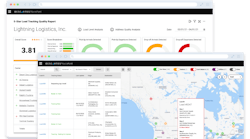It's show time. For the past three months I used this page to talk about the various tax-cut proposals being bandied about Washington. But this month I'm going to give you my own recommendations.
As someone who makes a living providing economic forecasts, I know the pitfalls of being wrong. That said, I'll start by pointing out that the best available forecasts do point to substantial budget surpluses in the future. I think all recommendations should be implemented immediately.
Income tax
Each marginal tax rate in the existing system should be reduced by five percentage points. There's no fair way to do it otherwise. We must accept the fact that as a nation we've had success with the current progressive tax system, and simply adjust it downward across the board.
To encourage people to buy rather than save — ensuring a strong demand for goods and services — the rate should be adjusted by two percentage points this year and next, and one point in 2003. If the surplus is not as large as predicted, we should postpone the reductions for a year, and reduce government spending by half the average annual shortfall for the next five years. Everything should be retroactive to January 2001.
Capital gains tax
I recommend reducing the capital gains tax for equities to a flat rate of 25%, and taxing all capital gains and dividends as ordinary income. I would also include a 2% flat tax on gains for that portion of a portfolio not sold during the year, with “year” defined by each taxpayer's date of birth. This will help sober up the speculators once a year without causing end-of-year sell-offs.
Estate tax
I recommend eliminating this tax for “active” assets, which are those in place to generate income through the production of goods or services, and result in the employment of people other than the asset holder. This will eliminate the need to close ongoing businesses in order to pay estate taxes. It's important to keep businesses in place, since they will generate payroll and capital gains taxes on their own. However, I do think we should retain the estate tax on passive assets, such as stocks and bonds held for investment purposes.
Excise tax
This tax should be eliminated for assets used in the production of goods or services, since it distorts the economic value of assets and leads to use of alternatives that are not as productive economically.
One-time refund
Anyone who paid taxes in 2000 should be given a one-time refund of $300, with the payments issued on taxpayers' birthdays. This format will stimulate consumption without the spike that would come from issuing all the checks at once.
I can't sign off without a tax break for our industry. Here's what I suggest. Instead of sending cash as foreign aid, let's send 500,000 used commercial vehicles that are three to seven years old, including 150,000 Class 8s, 100,000 Class 6 and 7s, and 250,000 trailers. Owners would receive non-transferable tax credits equal to the book value of the equipment. The tax credit would be allowed in three equal installments over the next ten years so owners would have sufficient profits to take advantage of it. The estimated $9 billion in administrative costs could be defrayed by reducing foreign aid by $1.8 billion for five years.
These tax reductions will buttress our currently struggling economy. Moreover, this means that Congress must justify any increase in spending that's beyond the economy's ability to finance it through tax revenues. We should let them increase taxes in the future, if it's really necessary. But it should be our choice, not theirs.


